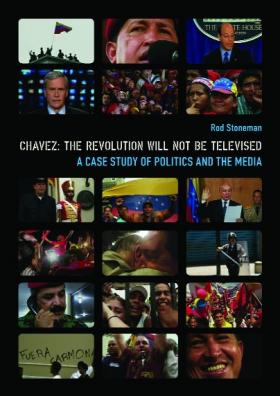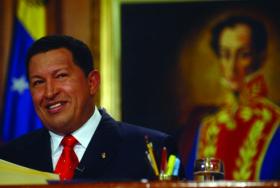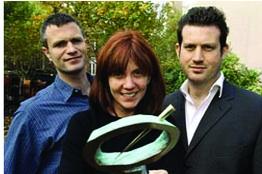TV Eye
Published in 20th-century / Contemporary History, Issue 4 (Jul/Aug 2008), Reviews, Volume 16
Front cover of Rod Stoneman’s book, Chávez: The Revolution Will Not Be Televised; a case study of politics and the media, which, together with a DVD of the film, will be published by Wallflower Press later this year. (Wallflower Press)
The Revolution Will Not Be Televised
First broadcast on RTÉ 1 in 2003 as Chávez—Inside the Coup
Power Pictures
by Rod Stoneman
At around 10pm on 11 April 2002, members of the military high command arrived in the presidential palace to demand the resignation of the government of Venezuela. They led the country’s president to an inner sanctum as government ministers circled around nervously in an atmosphere of terminal crisis. Dissident elements of the army threatened to bomb the palace unless the president resigned. The economic development minister looked close to tears: ‘It is the victory of the forces of death’. Amongst those waiting in the corridor outside the closed room for news of the tense discussions were two film-makers from Ireland who had been working for the last eighteen months to realise a documentary portrait of the president and the fast-changing political situation in his country. Using small, portable digital video cameras, they filmed the ensuing calamity. This is one of the most dramatic moments in The Revolution Will Not Be Televised.
In this moment a documentary that had originally been conceived of as a ‘personal profile and intimate portrait of Venezuela’s president’ was immediately and utterly changed. An electrifying drama unfolded as the film depicted a group of individuals, in potentially mortal danger, who were aware that they had been placed in the centre of historic events. Unexpected contingent factors had played a significant role in the filming of the coup d’état both on the streets of Caracas and also inside the Miraflores presidential palace, where the film captured the most intimate images of a regime in its moment of peril. The interaction of larger-scale social and political forces with the detail of chance events and the responses of various politicians, soldiers and government operatives was suddenly brought into unique focus.
The Revolution Will Not Be Televised was made by Irish film-makers Kim Bartley and Donnacha Ó Briain, with Galway-based independent production company Power Pictures. It centres on the charismatic and controversial Venezuelan president, Hugo Chávez, and charts the seven months leading up to the dramatic coup attempt of 11–14 April 2002. The film provides an eyewitness account of the coup d’état and the extraordinary return to power of Chávez some 48 hours later.
The finished documentary was shown on television and in film festivals around the world; it was immediately recognised as a well-realised, emotionally powerful and politically relevant film about Chávez, a new icon of the Left and a thorn in the side of the US administration. But it was the unique footage of an actual coup in progress that attracted attention in festival screenings and on television, and the documentary achieved a measure of global critical acclaim. The first screenings indicated to many, including the Venezuelan revolutionary government, that the film could play a catalytic role in the subsequent history of the country it sought to depict.
But controversy quickly built around the film and it was subject to an extensive critical and political attack in Venezuela, with over 10,000 people signing an internet petition, culminating in several fiercely disparaging articles. ‘The film amounts to propaganda for one side in a highly polarised political context’, wrote Caracas-based journalist Phil Gunson in an article entitled ‘Chávez: inside the con? Documentary and the fabrication of “truth”’. Gunson made sweeping denunciations of the film’s ‘obvious breaches of balance, fairness and accuracy’, and offered an alternative view of Chávez:
‘He is a fairly standard Latin American military demagogue, who openly disavows representative democracy (despite having used it to achieve power) and is now busily installing a dictatorship. By this account, his “wealth redistribution” is neither more nor less than the cynical and clientilistic purchase of a military/civilian power base.’

Hugo Chávez (with a portrait of his hero, Simón Bolívar, in the background), after winning his second term as president of Venezuela by a 2:1 margin in November 2006. (Indymedia)
Gunson also claimed that ‘polls have consistently shown that a majority would vote for a change in government’. The pressurised context of the contention around the film was the run-up to an important Recall Referendum that summer; in the poll on 15 August 2004 Chávez won 58 per cent of the votes. He subsequently achieved 63 per cent of the vote in the presidential election of December 2006.
The remarkable trajectory of the film and the powerful reactions it provoked have engendered a range of unexpected and longer-term questions. The intensity of the responses caught even the film-makers by surprise. People involved in film production often nurture ideas about the potential political effects of their films, but it is rare that the intervention of any one documentary subsequently plays such a direct and dramatic role in the politics of the situation it seeks to represent. It is not an exaggeration to say that the screening and discussion of this single film had a significant effect on that pivotal moment of Venezuelan politics.
In 1976 the German essayist and poet Hans Magnus Enzensberger wrote: ‘With the development of the electronic media, the industry that shapes consciousness has become the pacemaker for the social and economic development of societies in the post-industrial age’. Contemporary media, constituted by the digital formats that permeate the information epoch, have created an image system that is extraordinarily pervasive and powerful. From its title, The Revolution Will Not Be Televised, the film indicates its dual focus on both the political events and the central role of the media in an exacting political process. In the context of the coup, the film examines the role of the Venezuelan media at the moment of dynamic confrontation. But both Venezuelan and international reporting fell well short of a clear or accurate picture of events.
With the exception of the state channel, Venezolana de Televisión, five of the six television stations in Venezuela were privately owned, and they took strong and consistently critical stances in relation to the regime. From his election in 1998, Chávez had made use of state television and radio for direct, colloquial addresses to the electorate each week. The new president established himself as a brilliant communicator, speaking for hours on television in an informal and folksy manner that captivated his admirers and irritated his opponents. But this simple programme format on a rather staid official channel is very different in response and effect from the flow of negative commentary offered on the more colourful, energetic and entertaining screens of the commercial channels.

Left: Hugo Chávez (with a portrait of his hero, Simón Bolívar, in the background), after winning his second term as president of Venezuela by a 2:1 margin in November 2006. (Indymedia)
David Power (of Power Pictures), Kim Bartley and Donnacha Ó Briain receiving the ESB Media Awards ‘Journalist of the Year’ accolade on 29 October 2003 for their documentary Chávez—Inside the Coup. (ESB)
While different and specific historical and national circumstances are always in play in contemporary political conflicts, the centrality of the media is now a constant. In the 2002 coup in Caracas, the partisan intervention of the media became increasingly important as the social conflict escalated into a plot to unseat the regime. Communication is a crucial terrain of contention in political conflict, and it was the interaction of the media with popular power and the physical force of the state that determined the outcome of this moment of political jeopardy. Bartley and Ó Briain’s film is the nexus of a number of critical issues in relation to both contemporary political film-making and understandings of the potential for radical politics to bring about change in the world.
Rod Stoneman is Director of the Huston School of Film and Digital Media, NUI Galway.
















